Bill Gates and fellow billionaires invest in AI mapping technology to search for ethical cobalt

KoBold Metals will deploy big data and artificial intelligence in the hunt for ethical cobalt.
A Bill Gates-backed consortium of billionaires has financially thrown its support behind start-up KoBold Metals, which is hoping to use advanced mapping technology to search for ethical cobalt sources.
Venture capital firm Andreessen Horowitz (a16z) and Breakthrough Energy Ventures, which is financed by well known billionaires such as Jeff Bezos, Ray Dalio, Michael Bloomberg, Richard Branson and Bill Gates, have bet big on the Californian-based start-up KoBold Metals.
The company, established in 2018, is aiming to apply big data aggregation and basic science to materially improve the pace and efficacy of natural resources exploration.
It says it will apply its propriety technology platform, known as Machine Prospector, to explore for “new sources of ethical cobalt from reliable jurisdictions”.
“What we’re building is basically Google Maps for the earth’s crust and below,” Andreessen Horowitz partner Chonnie Chan was quoted as saying.
KoBold Metals has put together an impressive team, which includes a data and software arm as well as a science-focused division. Each of the company’s five founders and executives hold PhDs.
It’s unclear how much money the company has raised, or at what evaluation, and it’s understood the firm has already pegged ground in North America, where it will explore for cobalt.
Cobalt sources
KoBold’s mission is bold, but certainly has potential.
At present, cobalt is deemed a critical mineral with more than 45% of the metal directed to the battery market.
Importantly, cobalt is very useful for making the high capacity, fast charging, long-lived, and safe batteries needed for wide adoption of electric vehicles.
Given cobalt is a crucial metal for the lithium-ion batteries, the booming sustainable energy market is essentially powering demand for cobalt.

The cobalt price has been on a wild ride in recent years.
Unfortunately, the incumbent cobalt supply is ethically challenged, concentrated in unstable jurisdictions, and insufficient to meet growing demand.
While small cobalt operations can be found across China, Canada, Russia, Australia, Zambia, the Philippines, Cuba, Madagascar, New Caledonia and South Africa, most of the world’s cobalt, equating to about 60%, arises out of exploitative conditions in the Democratic Republic of Congo (DRC).
According to the US Geological Survey, the DRC contributed 66,000 tonnes to global cobalt supplies in 2016, which is more than half the world’s 123,000t produced that year.
While there have long been ethical concerns around the DRC’s mining sector, calls for transparency along the cobalt supply chain have recently intensified as human rights violation allegations out of the African country continue to proliferate.
KoBold Metals game plan
With demand for the mineral predicted to swell from 53,000t in 2015 to more than 120,000t by 2025, KoBold is hoping to tap into a market need for ethically-sourced cobalt.
It’s understood the company will deploy machine learning and other artificial intelligence techniques to a range of data sets which will be tested for cobalt. Should the company have success, it will then develop the site and offload it to the highest bidder.
“We don’t intend to be a mine operator ever,” said KoBold’s co-founder and chief executive officer Kurt House.
KoBold hasn’t yet disclosed the exact locations of its North American cobalt ground, nor the size.
